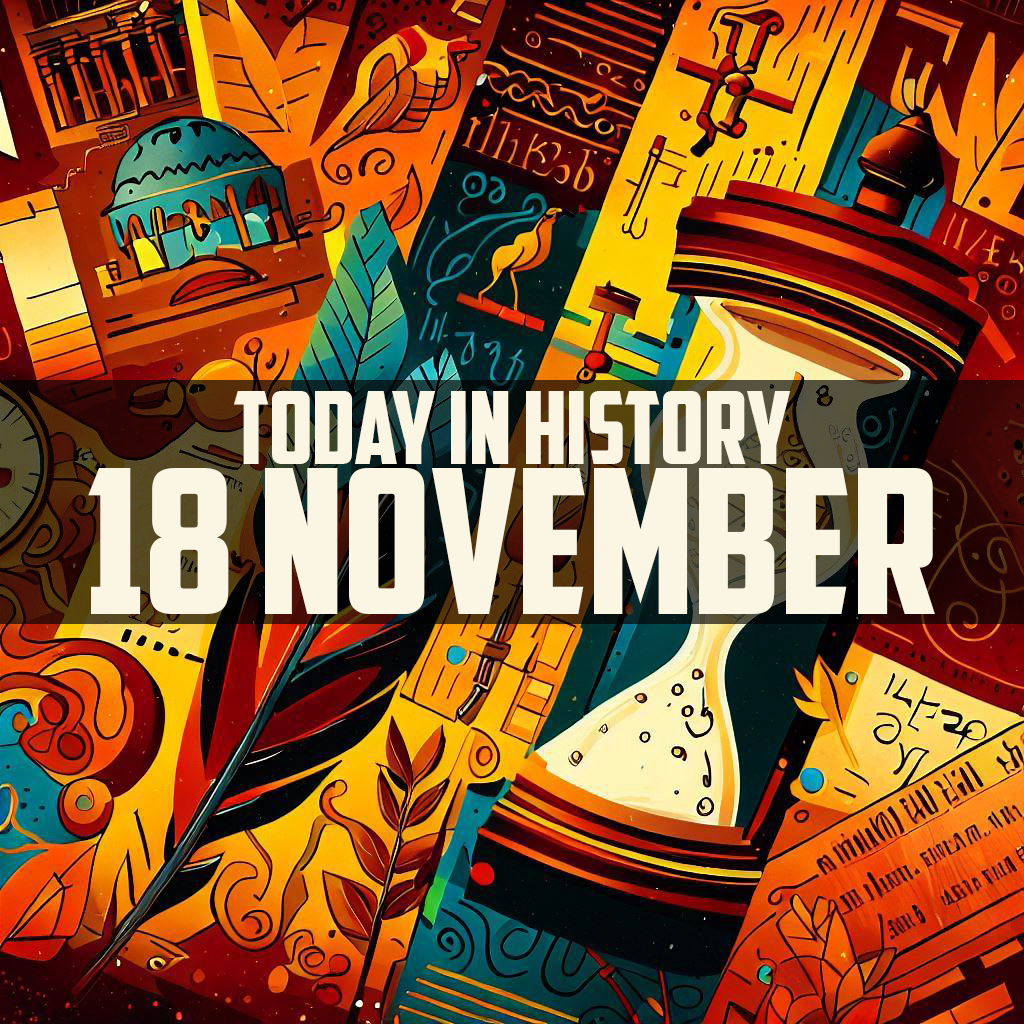Every date on the calendar is replete with historical happenings that shape the trajectory of human civilization. The 18th of November is no exception, with its rich tapestry of events across the globe. From monumental political revolutions to groundbreaking scientific advancements, 18 November provides a unique lens into the past. Let’s embark on a journey through the annals of history to understand the significance of this date.
Today in History: 18 November

1. 1307: The Arrest of the Templars
On this day, hundreds of members of the Knights Templar were arrested in France, orchestrated by King Philip IV. Accused of heresy and other crimes, this marked the beginning of the end for the influential Christian military order. The mass arrest led to the eventual disbanding of the Templars, with many of its members facing torture and execution.
2. 1493: Puerto Rico’s Discovery
Christopher Columbus landed on the island of Puerto Rico during his second voyage to the New World. This exploration would mark the beginning of European colonization in the region, bringing with it cultural, political, and social changes that would indelibly shape the island’s history.
3. 1626: St. Peter’s Basilica is Consecrated
Located in Vatican City, St. Peter’s Basilica, one of the world’s largest churches, was consecrated on 18 November 1626. Its construction spanned over 150 years, involving multiple popes and architects, including Michelangelo who designed its famous dome.
4. 1903: The Hay-Bunau-Varilla Treaty
The United States and Panama signed the Hay-Bunau-Varilla Treaty, granting the U.S. rights to build and control the Panama Canal, a crucial maritime shortcut between the Atlantic and Pacific Oceans. This treaty remained in effect until 1999 when control was handed back to Panama.
5. 1928: Mickey Mouse’s Debut
Walt Disney and Ub Iwerks introduced Mickey Mouse to the world in the short film “Steamboat Willie.” This iconic character would soon become a global symbol of the Disney empire, forever changing the landscape of animated entertainment.
6. 1961: President Kennedy Sends Advisors to Vietnam
President John F. Kennedy increased the number of military advisors in South Vietnam to help combat the rising threat of communism. This marked a significant escalation of U.S. involvement in Vietnam, paving the way for a larger military presence in the years to come.
7. 1963: The Push-button Telephone Introduced
Bell System introduced the first push-button telephone, replacing the traditional rotary dial. This technological innovation simplified phone use and laid the groundwork for future advancements in telecommunications.
8. 1970: U.S. President Richard Nixon Asks for Congressional Funding for Cancer Research
Nixon requested $100 million in funding to launch a campaign to find a cure for cancer. This initiative signified a major commitment to health and scientific research and solidified the disease’s position as a national priority.
9. 1978: Jonestown Massacre
One of the darkest events in modern history, more than 900 members of the Peoples Temple, led by Jim Jones, died in a mass murder-suicide in Jonestown, Guyana. This tragedy brought international attention to the dangers of cults and blind obedience.
10. 2002: UN Weapons Inspectors Return to Iraq
Under increasing international pressure, Iraq agreed to allow United Nations weapons inspectors back into the country. This move was pivotal in the lead-up to the 2003 invasion of Iraq by U.S.-led coalition forces.
11. 1991: The Croatian City of Vukovar Falls
After an 87-day siege, the city of Vukovar fell to Serbian forces during the Croatian War of Independence. The fall of the city marked a turning point in the war, leading to increased international intervention.
12. 1421: A Catastrophic Flood Hits the Netherlands
Referred to as the St. Elizabeth’s flood, the waters inundated parts of what is now the Netherlands, resulting in the death of thousands and altering the country’s landscape permanently.
13. 1883: Time Zones Introduced in the United States
To streamline the country’s train schedules and reduce confusion, time zones were introduced across the U.S. This system of standard time, proposed by Sir Sandford Fleming, would later be adopted worldwide.
14. 1999: The United Kingdom Devolves Power to Scotland
The UK transferred legislative powers to Scotland, marking a significant step in Scotland’s journey toward self-governance. This devolution of power would have considerable implications for UK politics in the years to come.
15. 1916: The Battle of the Somme Ends
One of the bloodiest battles in human history, the Battle of the Somme, concluded after five months of intense combat during World War I. The Allies and Central Powers suffered over a million casualties combined.

Conclusion:
The 18th of November, like many dates in history, showcases the breadth and depth of human experience. From scientific milestones to heart-wrenching tragedies, from acts of profound courage to moments of deep introspection, this day provides a rich tapestry of events that shape our collective memory. As we reflect on the happenings of this day in history, we are reminded of our shared past’s complexities, challenges, and achievements.
